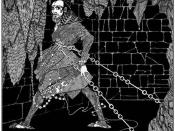The literary devices an author uses greatly influences the way a story is interpreted by the reader. Through different styles of writing, certain feelings are evoked in the reader. Especially in horror and gothic tales, the devices a writer uses can be used to create different moods in the story. The short story, "The Cask of Amontillado", written by Edgar Allan Poe contains many different literary devices. In the story, Montresor seeks revenge against Fortunato by murdering him. The literary devices irony, arabesque, and grotesque are used to create a wide variety of feelings and emotions within the reader.
One of the main literary devices Edgar Allan Poe uses in "The Cask of Amontillado" is irony. Three types of irony are used in the story: verbal irony, irony of situation, and dramatic irony. Verbal irony takes place when someone says something and means another. Irony of situation occurs when the opposite of what someone expects will happen happens.
When the readers know more than the characters in the story, it is called dramatic irony. The very first example of irony is at the very beginning of the story when Montresor tells the reader that he is planning to take revenge on Fortunato because Fortunato insulted him. This is an example of dramatic irony because even though Fortunato is not aware of Montresor's plans, the reader knows Montresor is plotting revenge on Fortunato. Dramatic irony is used again when Montresor describes how he portrays himself in his meetings with Fortunato. Montresor says "I continued, as was my wont, to smile in his face, and he did not perceive that my smile now was at the thought of his immolation." (Page 199) This means that when Montresor meets Fortunato, he smiles at him even though he imagines him...


